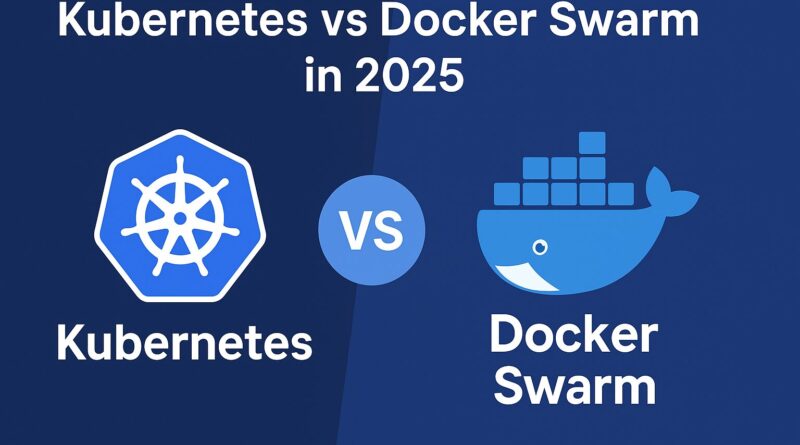Kubernetes vs Docker Swarm in 2025: Which One Should You Choose?
As cloud-native architectures dominate modern IT landscapes, developers and DevOps engineers continue debating Kubernetes vs Docker Swarm in 2025. Both container orchestration tools help manage containerized applications, but with the evolution of cloud strategies and edge computing, choosing the right one has never been more critical.
In this blog, we break down everything you need to know about these tools in 2025, compare their strengths and weaknesses, and help you decide which one aligns best with your project needs.
What Is Kubernetes?
Kubernetes, originally developed by Google and now maintained by the CNCF, is an open-source platform designed to automate deploying, scaling, and operating application containers. It has become the de facto standard in container orchestration due to its robust ecosystem and widespread support from major cloud providers like AWS, Azure, and Google Cloud.
📌 Kubernetes can handle thousands of containers and offers extensive control, automation, and scalability.
What Is Docker Swarm?
Docker Swarm is Docker’s native clustering and orchestration tool. It allows users to create and manage a cluster of Docker engines called a Swarm. It’s easy to set up, offers a familiar Docker CLI, and integrates tightly with Docker Compose, making it ideal for small-to-medium deployments.
⚡ Docker Swarm focuses on simplicity and quick deployments with minimal configuration.
Key Differences Between Kubernetes and Docker Swarm
| Feature | Kubernetes | Docker Swarm |
|---|---|---|
| Ease of Setup | Complex | Simple |
| Scalability | Extremely High | Moderate |
| Community Support | Huge | Limited |
| Networking | Advanced (CNI plugins) | Basic |
| Load Balancing | Ingress Controllers | Built-in |
| Logging & Monitoring | Requires external tools | Basic built-in |
| Rolling Updates | Yes | Yes |
| Self-Healing | Yes | Limited |
While Kubernetes is more powerful and feature-rich, Docker Swarm offers a lightweight, faster-to-deploy solution for teams with simpler needs.
Pros and Cons of Each Tool
Kubernetes
Pros:
- Massive community and cloud-native ecosystem
- Advanced networking and service discovery
- Ideal for enterprise-grade workloads
- Auto-scaling and high availability features
Cons:
- Steep learning curve
- Heavier resource footprint
- Complex configuration
Docker Swarm
Pros:
- Quick to install and configure
- Lightweight and resource-efficient
- Integrated with Docker CLI
Cons:
- Limited features compared to Kubernetes
- Slower community growth
- Lacks native advanced networking capabilities
Use Cases in 2025
Kubernetes in 2025:
With AI/ML, IoT, and edge computing booming, Kubernetes is now being used for:
- Federated edge deployments
- AI model orchestration using KubeFlow
- Serverless computing with Knative
- Secure multi-tenancy in hybrid environments
Docker Swarm in 2025:
Despite losing popularity, Docker Swarm still thrives in:
- Small startups or prototypes
- Rapid MVP deployment
- Lightweight edge devices
- Simpler CI/CD pipelines
Kubernetes vs Docker Swarm in 2025: Which One to Choose?
Here’s a decision matrix to guide you:
- Large Enterprises / Complex Workloads → Kubernetes
- Startups / Simpler Workloads → Docker Swarm
- Multi-cloud or Hybrid Deployments → Kubernetes
- Experimentation or Learning Environments → Docker Swarm
If your team has the skill set and infrastructure budget, Kubernetes is undoubtedly the future-proof choice. However, Docker Swarm remains a valuable tool for quick wins and focused deployments.
Final Thoughts
The Kubernetes vs Docker Swarm in 2025 debate hinges on your use case, team expertise, and long-term goals. Kubernetes has solidified its position as the industry leader, but Docker Swarm’s simplicity and ease of use still make it a relevant option in specific scenarios.
To sum up:
- Choose Kubernetes for production-grade orchestration at scale.
- Opt for Docker Swarm when speed and simplicity matter most.
No matter what you choose, both tools reflect the beauty of containerization and continue to push DevOps forward in 2025 and beyond.
Further Reading & Resources
Want to Dive into Other Trending Tech Topics in 2025?
Explore more of our expert-written guides and insights
- Shocking Truths About Deepfakes & Synthetic Identity Fraud in 2025
- Top 10 Must-Have Gadgets Powered by NVIDIA Tech in 2025
- GitHub Actions vs. Jenkins for Beginners: What to Use in 2025?
- Simplified Microservices Deployment on AWS ECS

